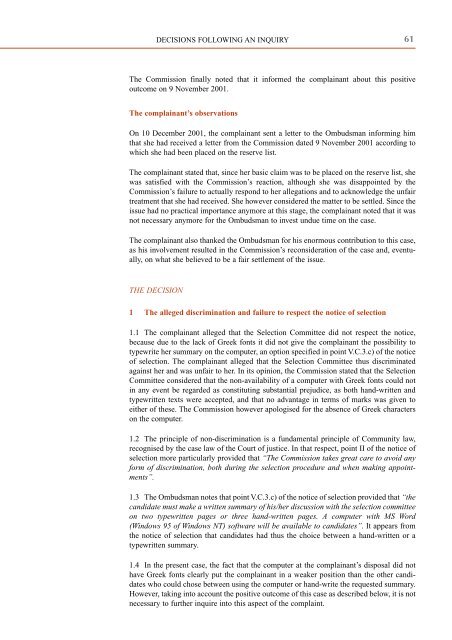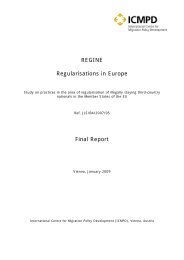Annual report 2002 - EOI
Annual report 2002 - EOI
Annual report 2002 - EOI
Create successful ePaper yourself
Turn your PDF publications into a flip-book with our unique Google optimized e-Paper software.
DECISIONS FOLLOWING AN INQUIRY 61<br />
The Commission finally noted that it informed the complainant about this positive<br />
outcome on 9 November 2001.<br />
The complainant’s observations<br />
On 10 December 2001, the complainant sent a letter to the Ombudsman informing him<br />
that she had received a letter from the Commission dated 9 November 2001 according to<br />
which she had been placed on the reserve list.<br />
The complainant stated that, since her basic claim was to be placed on the reserve list, she<br />
was satisfied with the Commission’s reaction, although she was disappointed by the<br />
Commission’s failure to actually respond to her allegations and to acknowledge the unfair<br />
treatment that she had received. She however considered the matter to be settled. Since the<br />
issue had no practical importance anymore at this stage, the complainant noted that it was<br />
not necessary anymore for the Ombudsman to invest undue time on the case.<br />
The complainant also thanked the Ombudsman for his enormous contribution to this case,<br />
as his involvement resulted in the Commission’s reconsideration of the case and, eventually,<br />
on what she believed to be a fair settlement of the issue.<br />
THE DECISION<br />
1 The alleged discrimination and failure to respect the notice of selection<br />
1.1 The complainant alleged that the Selection Committee did not respect the notice,<br />
because due to the lack of Greek fonts it did not give the complainant the possibility to<br />
typewrite her summary on the computer, an option specified in point V.C.3.c) of the notice<br />
of selection. The complainant alleged that the Selection Committee thus discriminated<br />
against her and was unfair to her. In its opinion, the Commission stated that the Selection<br />
Committee considered that the non-availability of a computer with Greek fonts could not<br />
in any event be regarded as constituting substantial prejudice, as both hand-written and<br />
typewritten texts were accepted, and that no advantage in terms of marks was given to<br />
either of these. The Commission however apologised for the absence of Greek characters<br />
on the computer.<br />
1.2 The principle of non-discrimination is a fundamental principle of Community law,<br />
recognised by the case law of the Court of justice. In that respect, point II of the notice of<br />
selection more particularly provided that “The Commission takes great care to avoid any<br />
form of discrimination, both during the selection procedure and when making appointments”.<br />
1.3 The Ombudsman notes that point V.C.3.c) of the notice of selection provided that “the<br />
candidate must make a written summary of his/her discussion with the selection committee<br />
on two typewritten pages or three hand-written pages. A computer with MS Word<br />
(Windows 95 of Windows NT) software will be available to candidates”. It appears from<br />
the notice of selection that candidates had thus the choice between a hand-written or a<br />
typewritten summary.<br />
1.4 In the present case, the fact that the computer at the complainant’s disposal did not<br />
have Greek fonts clearly put the complainant in a weaker position than the other candidates<br />
who could chose between using the computer or hand-write the requested summary.<br />
However, taking into account the positive outcome of this case as described below, it is not<br />
necessary to further inquire into this aspect of the complaint.
















